Mark David Gerson's Blog, page 11
April 4, 2013
Maya Angelou: The Call to Write

"There is no greater agony than bearing an untold story inside you."
~ Maya Angelou

What stories are you carrying inside you that are yearning to be freed onto the page?
What stories are you carrying inside that, once freed onto the page, will also free you?
Whatever they are, write one of them. Now.
Write your story, and feel the healing freedom that all creative acts inspire.
• For more writing inspiration, go to www.calltowrite.com for excerpts from The Voice of the Muse: Answering the Call to Write

• Today, April 4 is Maya Angelou's 85th birthday
Photo: Patrick Schneider
Please "like" these Facebook pages...
• Acts of Surrender book• The Q'ntana Trilogy Movies• The MoonQuest book• The Voice of the Muse book• Mark David GersonPlease follow Mark David on Pinterest and Google+
Published on April 04, 2013 19:22
March 28, 2013
The Story Knows Best
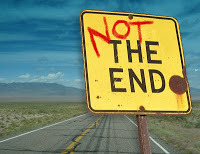 "There are no endings, only beginnings..."
"There are no endings, only beginnings..."~ Mark David Gerson
As I sit here staring at my blank screen and wondering what to write, I can't help but link this void to the void I have been feeling since late Tuesday afternoon, when I put to bed the final version of the final story in my Q'ntana Trilogy of novels and screenplays. In a process launched on New Year's Day this year, I had been going over the filmscripts for The MoonQuest, The StarQuest and The SunQuest and the novel manuscripts for The StarQuest and The SunQuest, making a last round of revisions before declaring them complete and ready for production (the films) and publication (the novels).
"Wonderful accomplishment," you might say. "But why the void?"
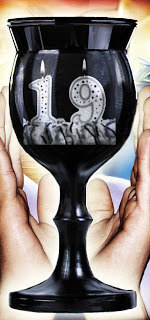 Good question. Consider this: When the first words of my first draft of
The MoonQuest
Good question. Consider this: When the first words of my first draft of
The MoonQuest
 pushed themselves out of me and onto the page 19 years ago today, I was still in the early stages of a creative awakening that was, then, only a few years old. While I had written some poetry and short literary vignettes, I had never tackled anything this ambitious. Not that I knew what I was doing. As I wrote in
Acts of Surrender: A Writer's Memoir
pushed themselves out of me and onto the page 19 years ago today, I was still in the early stages of a creative awakening that was, then, only a few years old. While I had written some poetry and short literary vignettes, I had never tackled anything this ambitious. Not that I knew what I was doing. As I wrote in
Acts of Surrender: A Writer's Memoir
 , I had no plans to write a fantasy novel (let alone a trilogy) and I knew nothing of the story, except as it revealed itself to me moment-to-moment. The story just happened to me.
, I had no plans to write a fantasy novel (let alone a trilogy) and I knew nothing of the story, except as it revealed itself to me moment-to-moment. The story just happened to me.In the intervening years, The MoonQuest book was finished and published (and won multiple awards), I wrote The StarQuest and The SunQuest novels (in much the way I had written The MoonQuest) and I wrote all three screenplays. And while I produced two other books in that time, The Voice of the Muse: Answering the Call to Write
 and
Acts of Surrender
, the bulk of my creative energy has been defined by these Q'ntana stories.
and
Acts of Surrender
, the bulk of my creative energy has been defined by these Q'ntana stories.Nineteen years: That's one-third of my life (so far) and half my adult life, largely dedicated to this multigenerational epic fantasy. And now it's finished. No wonder I feel empty, bewildered and uncertain, even as I also feel exhilarated, accomplished and gratified.
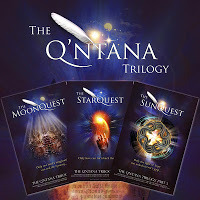 Of course, I'm not entirely done with my Q'ntana oeuvre. Production of the three Q'ntana Trilogy movies still lies ahead, and both The StarQuest and The SunQuest books await the resources and/or opportunities that will get them published and out into the world. But the writing -- all the writing -- is finished, and a 19-year-cycle along with it.
Of course, I'm not entirely done with my Q'ntana oeuvre. Production of the three Q'ntana Trilogy movies still lies ahead, and both The StarQuest and The SunQuest books await the resources and/or opportunities that will get them published and out into the world. But the writing -- all the writing -- is finished, and a 19-year-cycle along with it.So what's next? Even if I do end up directing the three Q'ntana films (and I'm open to letting the right someone else do it if that will accelerate funding and, hence, production), there is little for me to do until financing is in place. And while I continue to contribute what I can to that process, the primary responsibility for that lies (mercifully) with the producer. As for The StarQuest and The SunQuest books, their fate is in their own hands, as it has always been. When the time comes, I will actively promote them, as I have done with my other books. That time is not yet here.
So what's next? I don't honestly know. I have enjoyed teaching and speaking about writing, creativity and spirituality over the years (even more than, at times, I have enjoyed writing about them!), but I have grown weary of having to be the one who sets up the workshops, hustles for the participants and subsidizes the speaking engagements. As for writing, I can never stop being a writer. But apart from a small ebook project that I have been toying with (a Voice of the Muse supplement about overcoming writer's block), I have no projects in the pipeline, nor have any new ones shown up. And while I'm not limiting myself to speaking, teaching and writing, no other possibilities have presented themselves, either.
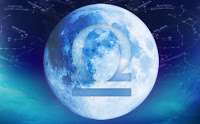 I recognize that in that cornucopia of possibility that is the infinity of the Universe, it is still early days. After all, it has been barely 48 hours since I did the final save of the final Q'ntana documents, and I have only barely recovered from the physical, creative and emotional push that helped me meet my March 26 goal. Why March 26? Among the myriad writings about yesterday's early morning full moon, I discovered these two questions on an astrological website early this week:
I recognize that in that cornucopia of possibility that is the infinity of the Universe, it is still early days. After all, it has been barely 48 hours since I did the final save of the final Q'ntana documents, and I have only barely recovered from the physical, creative and emotional push that helped me meet my March 26 goal. Why March 26? Among the myriad writings about yesterday's early morning full moon, I discovered these two questions on an astrological website early this week:• What is complete for you?
• Are you ready to move ahead?
When I recognized that endings/new beginnings was a key theme of this full moon (as well as of last week's Spring Equinox and this Passover/Easter week), I knew it was important that I time my Q'ntana completion with this lunar energy. After all, this whole journey began with a MoonQuest! The full-circle synchronicity of finishing two days shy of the 19th anniversary of The MoonQuest's conception (and the 18th of the completion of its first draft) also fed into my commitment.
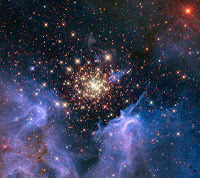 So, here I am, back where I began: still in the void. I had hoped that writing this piece would offer me a hint of my next journey. I had hoped it, but didn't really expect it. What it did do was remind me that I dwell in the same formless void that opens Genesis. While rarely a comfortable place to be, it's the perfect place for me to be right now as I await the next phase of my own Creation.
So, here I am, back where I began: still in the void. I had hoped that writing this piece would offer me a hint of my next journey. I had hoped it, but didn't really expect it. What it did do was remind me that I dwell in the same formless void that opens Genesis. While rarely a comfortable place to be, it's the perfect place for me to be right now as I await the next phase of my own Creation.My own words in The Voice of the Muse: Answering the Call to Write remind me of that. Here's how I ended the book as, in 2007, I readied myself to embark on new unmapped adventures...
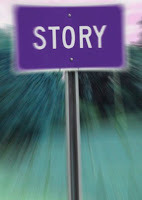 As I move into the next chapter of my life, I am reminded that this, like all journeys, is one of infinite surrender — word by word, moment by moment, breath by breath.
As I move into the next chapter of my life, I am reminded that this, like all journeys, is one of infinite surrender — word by word, moment by moment, breath by breath. I am particularly reminded of this as I reflect on where I wrote the first draft of this chapter: in Santa Fe, a city whose name translates as “holy faith.”
In this moment I cannot tell you how this chapter will end nor where the next will take me.
All I can do — all we can ever do, in writing as in life — is trust in the story.
It has never let me down before. Truly, the story knows best.
Truly, it does.
Please "like" these Facebook pages...• Acts of Surrender book• The Q'ntana Trilogy Movies• The MoonQuest book• The Voice of the Muse book• Mark David GersonPlease follow Mark David on Pinterest and Google+
Photos: "Celestial Fireworks" by NASA; "Story" by Mark David Gerson
Published on March 28, 2013 16:44
March 24, 2013
A Legacy of Trust
"You either trust or you do not. There is no halfway in between."
~ The Q'ntana Trilogy of fantasy novels and films
 My laptop is amazing. At six years and two months old, and now considered a "legacy machine" by the folks at Apple, it's still chugging along, if a little limpingly: Its DVD drive no longer drives (although it does still consent to play the occasional CD); its screen is missing a small cluster of pixels (conveniently located off-center) and, unless I tilt the screen just so, a line of color (conveniently located two-thirds of the way down); most of its letters have rubbed off the keyboard (I must have acidic fingertips as this happens to all my computers: Thank God for Grade 9 touch-typing with Miss Stolow!); I can no longer shift-T with its left shift key (though I can with its cap-lock and right shift keys); and its processing speed can best be described as "sitting-on-the-front-porch-sipping-a-mint-julep leisurely."
My laptop is amazing. At six years and two months old, and now considered a "legacy machine" by the folks at Apple, it's still chugging along, if a little limpingly: Its DVD drive no longer drives (although it does still consent to play the occasional CD); its screen is missing a small cluster of pixels (conveniently located off-center) and, unless I tilt the screen just so, a line of color (conveniently located two-thirds of the way down); most of its letters have rubbed off the keyboard (I must have acidic fingertips as this happens to all my computers: Thank God for Grade 9 touch-typing with Miss Stolow!); I can no longer shift-T with its left shift key (though I can with its cap-lock and right shift keys); and its processing speed can best be described as "sitting-on-the-front-porch-sipping-a-mint-julep leisurely."
But it must know that I haven't been in a position to replace it because it soldiers on, allowing me to finalize my three scripts for The Q'ntana Trilogy Movies (complete) and to finalize my novel manuscripts (currently in process) for The StarQuest and The SunQuest, Books II and III of the Q'ntana series.
It hasn't always been easy to trust my journey in the midst of these handicaps (and a handful of others -- all minor in the greater life-scheme of things...if nonetheless frustrating). But trust I must, or I risk betraying one of my trilogy's themes, as expressed in lines that appear in all three Q'ntana stories: "You either trust or you do not. There is no halfway in between."
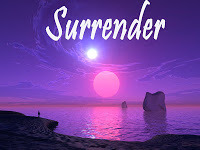 Letting go (surrendering) and trusting in a higher wisdom that is, most always, beyond both my human mind's capacity to understand and my human hands' capacity to affect, is much of what my journey has been about, and what it remains about. So, like my miracle "legacy laptop," I soldier on, trusting that all is well because, despite external appearances, all always is.
Letting go (surrendering) and trusting in a higher wisdom that is, most always, beyond both my human mind's capacity to understand and my human hands' capacity to affect, is much of what my journey has been about, and what it remains about. So, like my miracle "legacy laptop," I soldier on, trusting that all is well because, despite external appearances, all always is.
And so I say, Thank you, MacBook Pro (early 2007 issue), for reminding me every day that my life is an ongoing act of surrender -- one supported by trust and buttressed by faith. That's a pretty awesome legacy for a legacy laptop!
Photo Credits: #1 Hipstamatic's vintage view of my legacy laptop; #2 source unknown
Please "like" these Facebook pages...• Acts of Surrender book• The Q'ntana Trilogy Movies• The MoonQuest book• The Voice of the Muse book• Mark David GersonPlease follow Mark David on Pinterest and Google+
~ The Q'ntana Trilogy of fantasy novels and films
 My laptop is amazing. At six years and two months old, and now considered a "legacy machine" by the folks at Apple, it's still chugging along, if a little limpingly: Its DVD drive no longer drives (although it does still consent to play the occasional CD); its screen is missing a small cluster of pixels (conveniently located off-center) and, unless I tilt the screen just so, a line of color (conveniently located two-thirds of the way down); most of its letters have rubbed off the keyboard (I must have acidic fingertips as this happens to all my computers: Thank God for Grade 9 touch-typing with Miss Stolow!); I can no longer shift-T with its left shift key (though I can with its cap-lock and right shift keys); and its processing speed can best be described as "sitting-on-the-front-porch-sipping-a-mint-julep leisurely."
My laptop is amazing. At six years and two months old, and now considered a "legacy machine" by the folks at Apple, it's still chugging along, if a little limpingly: Its DVD drive no longer drives (although it does still consent to play the occasional CD); its screen is missing a small cluster of pixels (conveniently located off-center) and, unless I tilt the screen just so, a line of color (conveniently located two-thirds of the way down); most of its letters have rubbed off the keyboard (I must have acidic fingertips as this happens to all my computers: Thank God for Grade 9 touch-typing with Miss Stolow!); I can no longer shift-T with its left shift key (though I can with its cap-lock and right shift keys); and its processing speed can best be described as "sitting-on-the-front-porch-sipping-a-mint-julep leisurely."But it must know that I haven't been in a position to replace it because it soldiers on, allowing me to finalize my three scripts for The Q'ntana Trilogy Movies (complete) and to finalize my novel manuscripts (currently in process) for The StarQuest and The SunQuest, Books II and III of the Q'ntana series.
It hasn't always been easy to trust my journey in the midst of these handicaps (and a handful of others -- all minor in the greater life-scheme of things...if nonetheless frustrating). But trust I must, or I risk betraying one of my trilogy's themes, as expressed in lines that appear in all three Q'ntana stories: "You either trust or you do not. There is no halfway in between."
 Letting go (surrendering) and trusting in a higher wisdom that is, most always, beyond both my human mind's capacity to understand and my human hands' capacity to affect, is much of what my journey has been about, and what it remains about. So, like my miracle "legacy laptop," I soldier on, trusting that all is well because, despite external appearances, all always is.
Letting go (surrendering) and trusting in a higher wisdom that is, most always, beyond both my human mind's capacity to understand and my human hands' capacity to affect, is much of what my journey has been about, and what it remains about. So, like my miracle "legacy laptop," I soldier on, trusting that all is well because, despite external appearances, all always is.And so I say, Thank you, MacBook Pro (early 2007 issue), for reminding me every day that my life is an ongoing act of surrender -- one supported by trust and buttressed by faith. That's a pretty awesome legacy for a legacy laptop!
Photo Credits: #1 Hipstamatic's vintage view of my legacy laptop; #2 source unknown
Please "like" these Facebook pages...• Acts of Surrender book• The Q'ntana Trilogy Movies• The MoonQuest book• The Voice of the Muse book• Mark David GersonPlease follow Mark David on Pinterest and Google+
Published on March 24, 2013 04:55
March 20, 2013
Reach for the Stars...and Touch Them
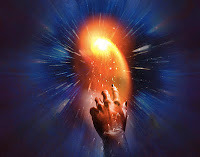 I've traveled many miles and lived through many lifetimes since I wrote this piece four years ago. But the story it tells and the message it imparts remain as relevant to me today as they were back in September 2008.
I've traveled many miles and lived through many lifetimes since I wrote this piece four years ago. But the story it tells and the message it imparts remain as relevant to me today as they were back in September 2008. "With all there isWhy settle for just a piece of sky?"~ from the score of the film Yentl

Thursday, Sept. 25, 2008 ~ Albuquerque, New Mexico
I'm walking on a nature trail in Albuquerque's Sandia Mountain foothills, the late-day sun gilding the granite outcroppings and illuminating the sage, cactus and juniper.
 This is one of my final farewell walks in a landscape that has so nurtured and inspired me.
This is one of my final farewell walks in a landscape that has so nurtured and inspired me.You see, in five days I will be gone from here, launched yet again on an open-ended, Spirit-directed odyssey into the unknown and unimagined -- my third such journey of faith in the past 11 years.
My first, in 1997, opened me to marriage, parenthood and life in a new country. The second, which spanned 30 months and was sparked by the end of that marriage, led to my first two books and CD and kindled for me a more empowered professionalism. Both journeys pushed and expanded me, challenging me to surrender more fully to the divine imperative that directs and prospers me -- when I let it.
In each case, I knew nothing of what lay head. I simply stepped off the cliff of my certainty and into the void from which all creation emerges.
Was I afraid? Sometimes.
Did I allow that fear to stand in my way? Rarely, and never for long.
As I think ahead to what's next, this lyric from Osibisa's song "Woyaya" plays in my head:
We are going
Heaven knows where we are going
We'll know we're there
We will get there
Heaven knows how we will get there
We know we will
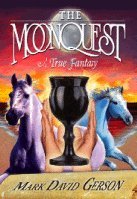 I'm also reminded of the scene in The MoonQuest where Toshar and his three companions must step through an opening that will carry them "beyond the end of the known world."
I'm also reminded of the scene in The MoonQuest where Toshar and his three companions must step through an opening that will carry them "beyond the end of the known world."Dense smoke chokes them where they stand as the jungle through which they have trekked burns up. There is no way back.
The only way is forward -- into the unknown, with its challenges and opportunities. With its secrets and mysteries. With gifts more wondrous and miracle-filled than any they could imagine.
When I left Toronto in 1997, the only direction I had from my GPS (God Positioning System) was to head west. Ultimately, it landed me in a new life in Sedona, Arizona.
When I left Sedona seven years and a Hawaii sojourn later, my GPS also sent me west -- at first. In the many months of cross-country travel that followed, I always managed to find my way back to the New Mexico that has been my full-time home for the past year.
Now, as I prepare to leave Albuquerque, my divine compass points eastward, directing me to the McDonald Observatory near Fort Davis, Texas.
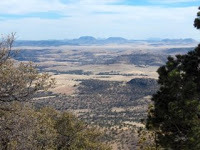 I've felt pulled toward the home of National Public Radio's StarDate since August, when I knew I would be returning to the road.
I've felt pulled toward the home of National Public Radio's StarDate since August, when I knew I would be returning to the road.It was a mystifying pull because, as stunning as is the observatory's setting and as fascinating as is its planetarium show, I've been there -- twice -- and never experienced any life-altering epiphanies.
At a conscious level, at least, it was a fun place to visit. Nothing more.
Yet if I've learned anything through my years of personal and spiritual growth, it's the importance of surrendering to the highest imperative I can access in any given moment. (There's a reason why the word "surrender" appears 67 times in The Voice of the Muse!) Like Toshar and his friends, I too must surrender to whatever lies beyond the end of my known world and be open to all the wonders that await me on the other side.
And so, if that highest imperative is sending me back to southwest Texas, I'll go -- whatever it means.
I've asked what it means countless times in recent weeks. Today, on my Sandia walk, I ask again.
For the first time, I hear an answer: "To remind you to reach for the stars."
Now, as I write these words, that same inner voice adds: "Reach for the stars...and touch them."
We all need reminders to reach for the stars, that potent metaphor for our highest, most divine potential. In these challenging, turbulent times, we also need to be reminded that those stars are not beyond our grasp. We can touch them. All it takes is a hand, outstretched to the infinite...the infinite we already are.

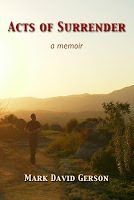 • Discover how this journey (and many others) unfolded in my new memoir, Acts of Surrender: A Writer's Memoir, available exclusively for Kindle, Nook, Kobo and iBook
• Discover how this journey (and many others) unfolded in my new memoir, Acts of Surrender: A Writer's Memoir, available exclusively for Kindle, Nook, Kobo and iBook"Reach for the Stars...and Touch Them" originally appeared on my now-dormant New Earth Chronicles blog. Click here to read the original post and its comments
Image Credits: Detail from the working poster for The StarQuest Movie by Richard Crookes. Photos by Mark David Gerson: #1 Sandia Foothills, Albuquerque, NM; #2 From the McDonald Observatory, near Fort Davis, TX
Please "like" these Facebook pages...• Acts of Surrender book• The Q'ntana Trilogy Movies• The MoonQuest book• The Voice of the Muse book• Mark David GersonPlease follow Mark David on Pinterest and Google+
Published on March 20, 2013 04:55
March 17, 2013
Mission: Possible!
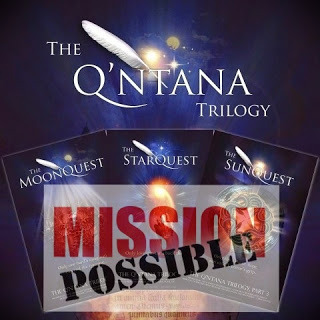
A few days ago, I completed a 72-day journey of reading/revising my three scripts for The Q'ntana Trilogy Movies from a director's perspective. It was an exhaustive, sometimes exhausting, exhilarating, sometimes emotionally draining experience that involved revisiting each of my MoonQuest, StarQuest and SunQuest stories and, in many ways, reliving them all.
I had launched the exercise on January 1, intent on discerning with my director's eye what wasn't going work on the screen and then getting my screenwriter-self to effect the necessary script changes. I set my completion goal for March 13...largely because I liked the numerical symmetry of 03-13-13. However, as February rolled into March, I grew increasingly doubtful that I would be able to meet my arbitrary deadline. There was just too much work left to do. Or so I thought.
Yet by dinnertime on March 13, my screenwriter-self had implemented all the revisions and rewrites mandated by my director-self.
 The result: a trio of largely final preproduction scripts for The MoonQuest, The StarQuest and The SunQuest movies.
The result: a trio of largely final preproduction scripts for The MoonQuest, The StarQuest and The SunQuest movies.I had met my goal.
I was stunned
I shouldn't have been. I should have remembered that, regardless of external appearances, nothing is impossible. I should have remembered that fact not only because it is a recurring theme in all three Q'ntana stories. I should have remembered it because it is a recurring theme in my life, a life in which, like the Q'ntana protagonists, I have often transcended the conventionally possible to achieve something astonishing.
With the three scripts in preproduction readiness, the next item on my Q'ntana agenda -- to go through each script scene-by-scene with the project's producer -- was to have been a largely mechanical one. Instead, it turned into something quite different. We had barely begun when I found myself not only summarizing each scene but acting it out and getting so "into" it that our cafe neighbors (Panera/MoonQuest on Friday, Starbucks/StarQuest on Saturday) must have thought me quite mad.
I talked loudly, gesticulated dramatically and got more publicly into the stories than I have ever done. I felt (and likely acted) as though I had consumed many gallons of high-octane espresso when, in fact, my high-octane energy came directly from the stories themselves. It was a creative high like none I have ever experienced, and it did more than renew my not-always-constant confidence in myself, my stories, their books and their films. It augmented that confidence and my optimism many-fold.
Now that the producer and I have completed that process with The SunQuest, I'm excited to re-experience both The StarQuest and The SunQuest book manuscripts from this same revitalized place as, later this week, I revisit them as well. My task? To determine which of the story revisions and improvements made during the past months to the screenplays should migrate back into the novels. Once that task is complete (no deadline yet!), The StarQuest and The SunQuest will be primed for publication and I can resume my director-prep duties on The Q'ntana Trilogy Movies.
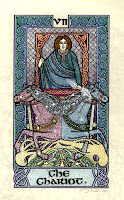 What a journey this has all been! It is certainly not one I could have anticipated 19 years ago this month, when The MoonQuest book began pushing itself -- surprisingly and with surprising force -- out of me and onto the page (an experience I describe in my 2012 memoir, Acts of Surrender: A Writer's Memoir). No doubt I will someday look back on this month's experiences with the same awe and amazement with which I now view March 28, 1994, the day The MoonQuest: A True Fantasy was born from The Chariot card in the Courtney Davis
Celtic Tarot Deck
What a journey this has all been! It is certainly not one I could have anticipated 19 years ago this month, when The MoonQuest book began pushing itself -- surprisingly and with surprising force -- out of me and onto the page (an experience I describe in my 2012 memoir, Acts of Surrender: A Writer's Memoir). No doubt I will someday look back on this month's experiences with the same awe and amazement with which I now view March 28, 1994, the day The MoonQuest: A True Fantasy was born from The Chariot card in the Courtney Davis
Celtic Tarot Deck

For now, I celebrate "the impossible," knowing that it's entirely possible and knowing, too, that what awaits me next is certain to be as unimaginable (and conventionally impossible) as what brought me to this moment. Thank you for joining me on this amazing journey!
• To celebrate this month's Q'ntana achievements and The MoonQuest's March 28 birthday, I am once again offering signed copies of both The MoonQuest and The Voice of the Muse: Answering the Call to Write from my website. My web store will remain open through the end of the month for book orders but will shut on March 31, after which paperback copies of both books will, once again, only be available at Amazon.com
 .
.Let March be a MoonQuest birthday month for you too: Get your signed books today at my website's Birthday Bookstore!
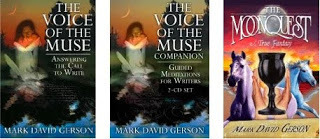
Please "like" these Facebook pages...
• Acts of Surrender Book• The Q'ntana Trilogy Movies• The MoonQuest book• The Voice of the Muse book• Mark David GersonPlease follow Mark David on Pinterest and Google+
Published on March 17, 2013 15:44
March 1, 2013
Mark David's "Rules" for Living
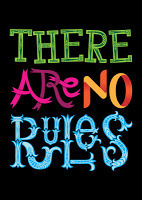 These so-called rules have long been on the home page of my website, inspired by the "rules" for writing I first crafted for my book on writing/creativity, The Voice of the Muse: Answering the Call to Write.
These so-called rules have long been on the home page of my website, inspired by the "rules" for writing I first crafted for my book on writing/creativity, The Voice of the Muse: Answering the Call to Write. The two sets of "rules" are intentionally similar because I believe that the same precepts that can guide us to more creative, imaginative, expressive, passion-filled and spontaneous writing and artistry apply equally to living a more creative, imaginative, expressive, passion-filled and spontaneous life.
Rule #1
There are no rules: There is no right way. There is no wrong way. There is only your way...the way that works for you.
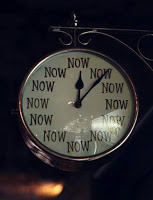 Rule #2
Rule #2What works for you today may not work tomorrow, so you might as well live in the present moment.
Rule #3
Listen to your heart and trust it; it speaks with the voice of God (or whatever you call that divine intelligence we all carry).
Rule #4
Be vulnerable: Share your pain and your passion. That's what makes you human.
Rule #5
Treat yourself as you would your child or best friend: with love, compassion and respect.
Rule #6
It's not what you do, it's how you live (and love).
Rule #7
It's not how often you meditate, it's whether you live your life as a meditation.
 Rule #8
Rule #8Giggle. Smile. Guffaw. Don't take life too seriously. Just as you don't censor your pain (see Rule #4), don't censor your joy.
Rule #9
It's not how hard you push, it's how fully you surrender.
Rule #10
Find your passion and embrace it. Passionately.
Rule #11
It's not about being perfect, it's about being human.
Rule #12
Empower yourself: This is your life. Don't let anyone else tell you how to live it (or not live it).
Rule #13
There are no rules. None. Never.
You'll find a more detailed version of my writing rules in The Voice of the Muse: Answering the Call to Write (paperback or ebook) and on The Voice of the Muse Companion: Guided Meditations for Writers (CD or MP3 download).
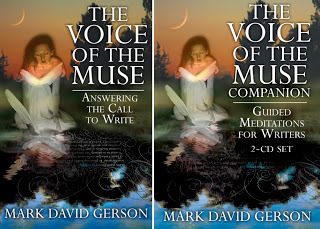
• Images: "There Are No Rules" by Wharton; "I Choose Joy" from Teri Wilder's CD of the same name
Please "like" these Facebook pages...
• Acts of Surrender Book• The Q'ntana Trilogy Movies• The MoonQuest book• The Voice of the Muse book• Mark David GersonPlease follow Mark David on Pinterest and Google+
Published on March 01, 2013 00:11
February 26, 2013
Mark David's "Rules" for Writing
 These so-called rules, adapted from the ones I crafted for my book on writing/creativity, The Voice of the Muse: Answering the Call to Write, are intentionally similar to my other set of "rules," for living, which I will post here on March 1.
These so-called rules, adapted from the ones I crafted for my book on writing/creativity, The Voice of the Muse: Answering the Call to Write, are intentionally similar to my other set of "rules," for living, which I will post here on March 1.They're similar because I believe that the same precepts that can guide us to more creative, imaginative, expressive, passion-filled and spontaneous writing and artistry apply equally to living a more creative, imaginative, expressive, passion-filled and spontaneous life.
 Rule #1
Rule #1There are no rules: How can there be when creativity is all about breaking new ground and breaking old rules?
Rule #2
Be in the moment: Focus only on the word you're writing. The next one will come if you don't worry about it.
Rule #3
Trust the voice of your Muse without judgment or censorship. It's smarter than you are and knows the story better than you ever will.
Rule #4
Be vulnerable: Write from a place of powerful emotion, especially the one you'd rather not write about.
Rule #5
Love yourself and your words...every draft.
Rule #6
Don't force your words into the straitjacket of your preconceptions and expectations. Free them to take on the form that is theirs.
 Rule #7
Rule #7If you're feeling stuck, keep your pen moving. Write anything!
Rule #8
Always go with first thoughts. Second-thoughts are self-censoring thoughts.
Rule #9
You're not in charge, so get out of the way and let your story have its way with you.
Rule #10
Write: Commit to yourself as the writer you are.
Rule #11
Set easy goals and meet them. Set yourself up for success not for failure.
Rule #12
Empower yourself: This is your creative journey. Don't let anyone else take charge of it.
Rule #13
There are no rules. None. Never.
Check back here on March 1 to read my "rules" for living. You'll find a more detailed version of the writing rules in The Voice of the Muse: Answering the Call to Write book (paperback or ebook) and on The Voice of the Muse Companion: Guided Meditations for Writers (CD or MP3 download).

Please "like" these Facebook pages...
• Acts of Surrender Book• The Q'ntana Trilogy Movies• The MoonQuest book• The Voice of the Muse book• Mark David GersonPlease follow Mark David on Pinterest and Google+
Published on February 26, 2013 11:12
February 12, 2013
New Rhythms, New Routines
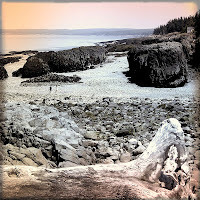 How I shattered old rhythms and forged new routines to get past some of my creative blocks: An excerpt from The Voice of the Muse: Answering the Call to Write
How I shattered old rhythms and forged new routines to get past some of my creative blocks: An excerpt from The Voice of the Muse: Answering the Call to Write
Because so much of my writing history at the time I created my novel The MoonQuest
 was linked to desks, deadlines and other people’s projects, the only way I could banish old associations that felt anything but free-flowing was to break all the patterns of my previous writing life.
was linked to desks, deadlines and other people’s projects, the only way I could banish old associations that felt anything but free-flowing was to break all the patterns of my previous writing life.First I abandoned the computer, composing The MoonQuest ’s early drafts with pen and paper. Next, I abandoned my desk, bound as it was to the soul-numbing words that had so recently comprised my freelance-writing livelihood.
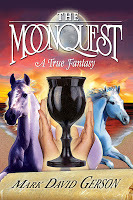 Mornings, with a pad balanced on my knee, just before or after breakfast, I allowed The MoonQuest’s scenes to pour from my pen onto the blank page. Evenings, I input the day’s jottings into the computer.
Mornings, with a pad balanced on my knee, just before or after breakfast, I allowed The MoonQuest’s scenes to pour from my pen onto the blank page. Evenings, I input the day’s jottings into the computer.Some days I needed a more dramatic break from the old to connect with my nascent story. On those days I often drove over North Mountain to Baxter Harbour on the Bay of Fundy. There, as the Atlantic surf crashed on the rocky Nova Scotia shore, I sat in the car or on a boulder and let the ocean tell me what to write next. A one-day change of habit and venue was all it took to put me back on track.
Here’s a suggestion:
When you feel blocked, break the pattern of your normal routine. If you normally write on the computer, switch to pen and paper. Write in the morning instead of the afternoon or evening, or vice versa. If you tend to write at your desk, move away from the perceived pressures of your "work" environment. Go for a walk to clear your mind. Take pad and pen and curl up in a comfortable chair. Sit out in nature. Move to a favorite café. Drive to some place quiet...different...inspirational. And feel the creative power of your new rhythm.
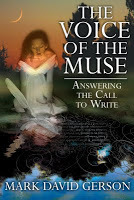 Adapted from The Voice of the Muse: Answering the Call to Write (c) Mark David Gerson
Adapted from The Voice of the Muse: Answering the Call to Write (c) Mark David Gerson• For more Voice of the Muse excerpts, visit the book's website or Facebook page
• Get your copy of The Voice of the Muse and The MoonQuest today: in paperback at Amazon.com
 or as an ebook for Kindle, Nook, iBook or Kobo apps and readers
or as an ebook for Kindle, Nook, iBook or Kobo apps and readersPhoto: Baxter Harbour, Nova Scotia. Photographer Unknown
Please "like" these Facebook pages...
• Acts of Surrender Book• The Q'ntana Trilogy Movies• The MoonQuest book• The Voice of the Muse book• Mark David GersonPlease follow Mark David on Pinterest and Google+
Published on February 12, 2013 09:10
February 7, 2013
Why Are Americans Afraid of Dragons?
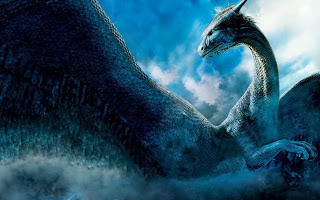
It's December 2008 and I'm in the video section of Target, Christmas shopping for my daughter. As I'm browsing through the movie racks, I overhear an older and younger woman discussing which DVD to buy a child on their list.
"What about Eragon
 ?" the younger woman asks. "I hear it's good."
?" the younger woman asks. "I hear it's good.""Does it have magic in it? I don't want a movie with magic," the older one -- her mother? -- responds sternly.
They move out of earshot and I'm too stunned to follow.
Are we truly living in some version of The MoonQuest's mythical setting? This land where vision is outlawed and visionaries put to death, where myth and magic are forbidden, where "once upon a time" is a forbidden phrase, and where fact is the only legal tender was a creation of my imagination... Or was it?
What kind of culture have we created where children are denied magic, where fantasy is suspect and where dragons are relegated to dustbins?
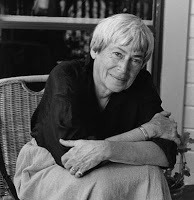 Thirty years ago in an essay, author Ursula K. Le Guin
Thirty years ago in an essay, author Ursula K. Le Guin asked, "Why are Americans afraid of dragons?" She concluded that most technological cultures dismiss works of the imagination because they lack measurable utility, an outlook only exacerbated in this country by our Puritan heritage.
asked, "Why are Americans afraid of dragons?" She concluded that most technological cultures dismiss works of the imagination because they lack measurable utility, an outlook only exacerbated in this country by our Puritan heritage.If 30 years ago dragons were not fit for adults, are they now unfit for children, too?
While the Harry Potter
 books and movies broadened the reach of imaginative fiction for kids (and adults), it also expanded our hysterical suspicion and suppression of it.
books and movies broadened the reach of imaginative fiction for kids (and adults), it also expanded our hysterical suspicion and suppression of it.The fact is, imaginative fiction opens our hearts, expands our spirit and broadens our minds in ways that nonfiction never can, and that magical/fantastical fiction can carry more truth in its castles, dragons and trolls than many pieces of so-called literature.
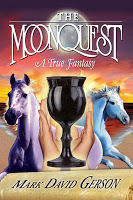 That's why I call The MoonQuest
That's why I call The MoonQuest a "true fantasy." There is nothing factual about it. But as those two women in Target have proven, it's decidedly true.
a "true fantasy." There is nothing factual about it. But as those two women in Target have proven, it's decidedly true.This piece originally appeared in December 2008 on my now-dormant New Earth Chronicles blog.
Please "like" these Facebook pages...
• Acts of Surrender Book• The Q'ntana Trilogy Movies• The MoonQuest book• The Voice of the Muse book• Mark David GersonPlease follow Mark David on Pinterest and Google+
Published on February 07, 2013 09:10
February 3, 2013
Death to the Ego? Not!
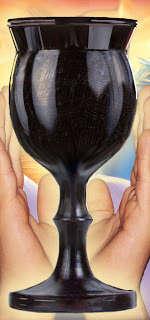 "Despise Fvorag and you despise a part of yourself. For we are all One in Prithi."
"Despise Fvorag and you despise a part of yourself. For we are all One in Prithi."— The MoonQuest: A True Fantasy
" Death to the Ego!" I've heard that war cry, so common in personal-growth circles, several times in recent days. And each time, it left me profoundly saddened.
You see, the oft-demonized ego doesn't deserve to die. No part of us deserves to die.
No part of us deserves to be dismissed...or dissed. All parts of us have value. All parts of us have worth. All parts of us are capable of growth and transformation. Of redemption.
Many writers and therapists would have you believe that the ego is some inner evil that must be cut off, stamped out and killed before we can move forward.
"Ego," I read the other day, "is the biggest — and perhaps the only — obstacle to true enlightenment. If we want to be free, if we want to be enlightened, we have to pay the price: death of the ego."
Not only is that view wrong-headed, it is damaging.
Certainly, the ego or "small self" can stand in the way of our evolution. Yet whatever else it is or does, it is still a part of our greater self, of our oneness. Of God.
God, however you define it, is made up of all the pieces of us — dark and light, evolved and not. God is not just the pieces we like or would prefer.
When we use phrases like "death of the ego," we're advocating an act of self-hatred and self-destruction that is not at all godlike.
How can we call for oneness in one breath and the destruction of a part of ourselves in the next? How can we preach love as the energy that creates and heals all when, in the same sentence, we preach hatred toward parts of ourselves?
If your arm is broken, do you cut it off because it's now a useless appendage? Or do you allow it to heal, lavishing extra love and energy upon it because of its weakened condition?
The ego is no less deserving of care and no less capable of healing and transformation.
I passionately believe that we are called to love, honor and respect all aspects of our beingness, not just the ones that behave in right/light ways.
We live in a throwaway culture, tossing out anything that's broken, a culture where imperfection is punished and misbehavior condemned. What have we become that we are now throwing away bits of ourselves?
The ego is nothing more than a terrified, lesser-developed aspect of ourselves, a child-aspect that feels threatened by change it does not understand and so resists, often disruptively.
In many ways, it's like a fearful child. We don't kill our children when they don't act in a divine manner, when they're frightened and act out. We reassure them, we hold them, we love them. We make sure they know that they're safe.
Through these compassionate, godlike acts, we gently correct their failings and contribute to their growth and evolution, and to our own.
Our call is to do the same with the ego. Speaking of killing, expelling, conquering or controlling it is the antithesis of the evolved energy we claim we are seeking to embody.
Some might respond by saying that these are only words, that nothing is really being killed.
Perhaps. But language is not random. We choose our words, and these words reveal more about what we think and feel than we often realize. If we use words like "death" and "killing," than that truly is the consciousness we are projecting.
Oneness, too, is a consciousness, one that cannot thrive outside of us if it doesn't first thrive within. And it cannot thrive within if we reject even a single part of ourselves.
Oneness is an act of integration. Preaching death to the ego is the opposite: dis-integration.
The only path to enlightenment is the path of love. And the only path of love that has any value is the path that begins with self-love, with the love of our entire self — the wounded as well as the healed, the frightened as well as the fearless, the dark as well as the light.
Loving it doesn't free it to be in charge or hold us back. It does free it to have a voice, to express its fears, to cry for help in the only ways it knows how.
That same love frees you to embrace every part of you, to welcome home the ugly, wounded, frightened prodigal-child/ego and to live the fullness of a divinity and godliness that includes all aspects of your beingness.
I believe in you, in every part of you, and I love your darkness as well as your light. Won't you do the same for yourself?
• This piece originally appeared in my now-dormant New Earth Chronicles blog. Unfortunately, it remains as relevant today as it was a few years ago, when I first wrote it.
Image: Detail from the cover of The MoonQuest (The Q'ntana Trilogy, Part 1)
 by Mark David Gerson
by Mark David GersonPlease "like" these Facebook pages:• Acts of Surrender Book• The Q'ntana Trilogy Movies• The MoonQuest book• The Voice of the Muse book• Mark David GersonPlease follow Mark David on Pinterest and Google+
Published on February 03, 2013 11:44



